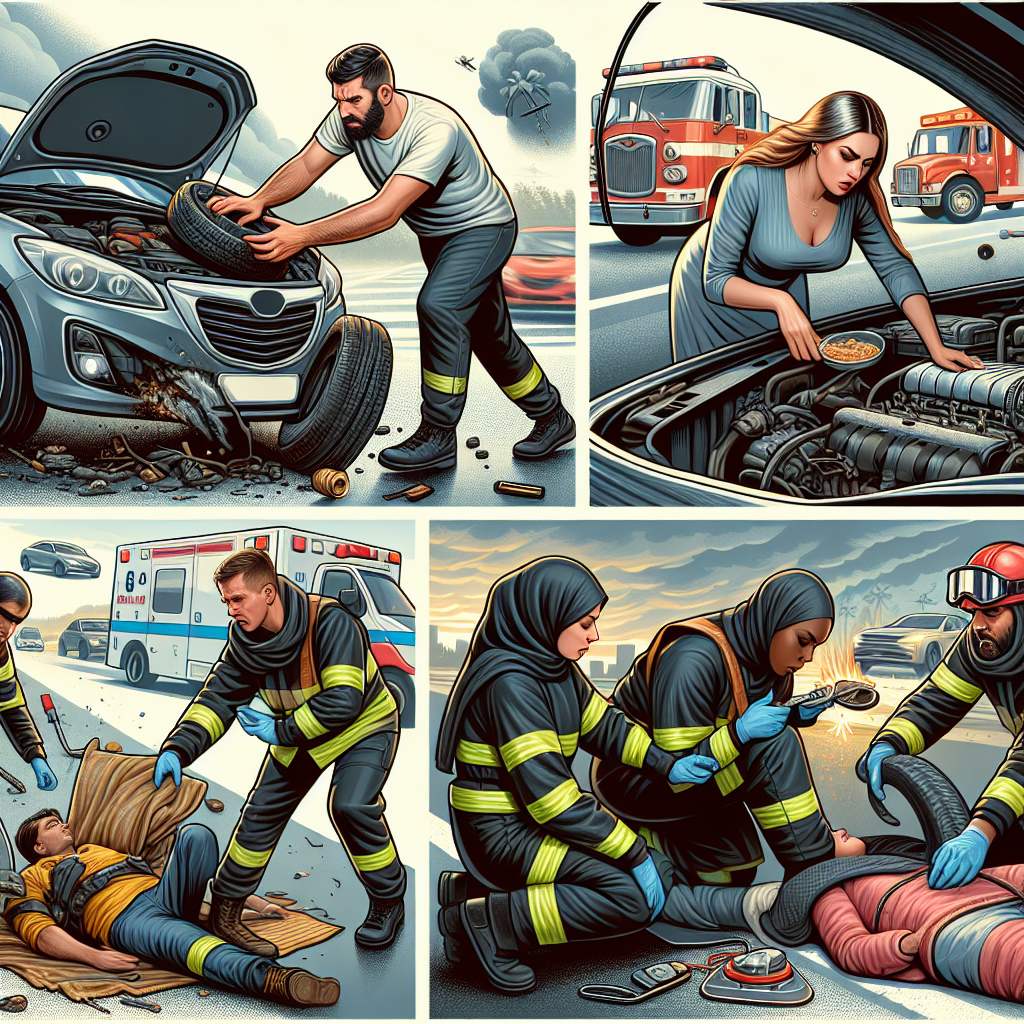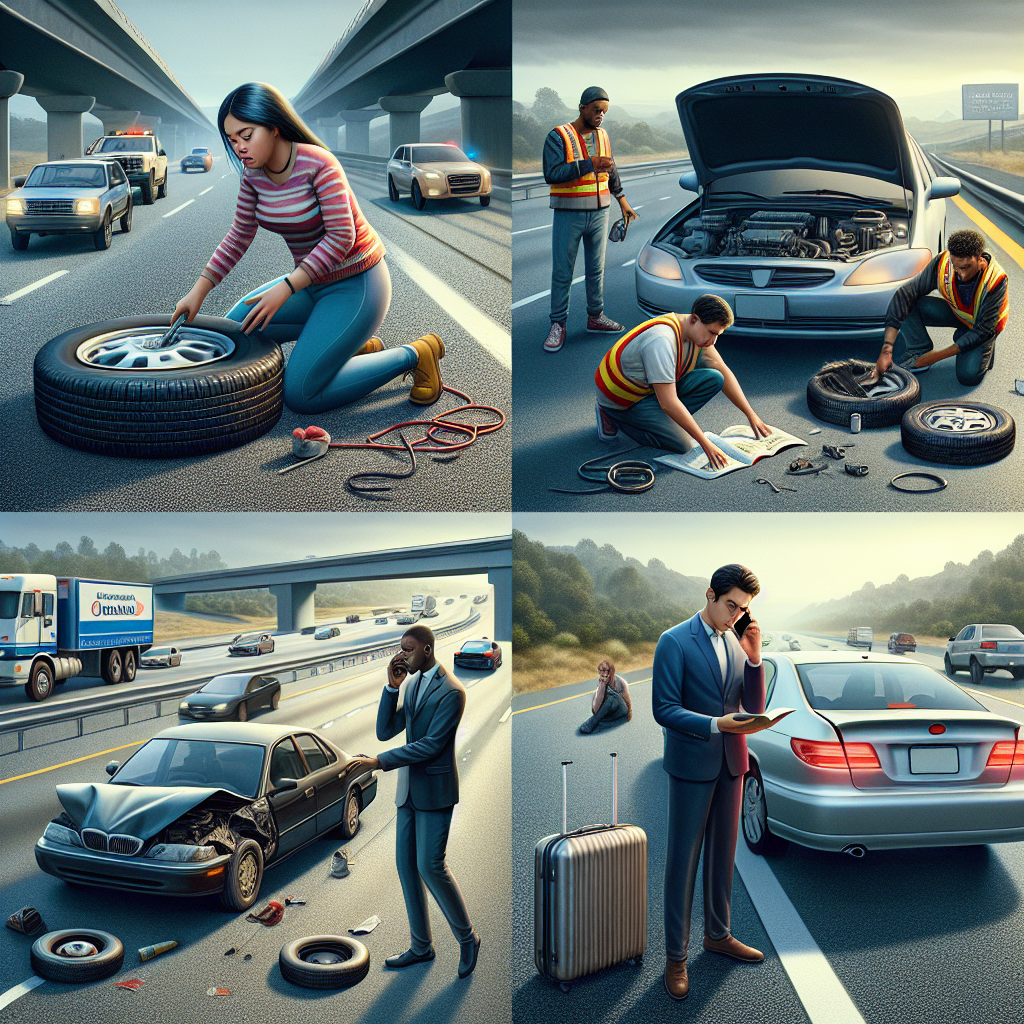-
Table of Contents
- Dealing with Emergencies on the Road: Tire Blowouts, Engine Failures, and Accidents
- Tire Blowouts: Causes and Prevention
- Causes of Tire Blowouts
- Preventing Tire Blowouts
- Engine Failures: Causes and Response
- Causes of Engine Failures
- Responding to Engine Failures
- Accidents: Prevention and Response
- Preventing Accidents
- Responding to Accidents
- Summary
Dealing with Emergencies on the Road: Tire Blowouts, Engine Failures, and Accidents

Driving on the road can be an exhilarating experience, but it also comes with its fair share of risks. Emergencies can happen at any time, and being prepared to handle them is crucial for every driver. In this article, we will explore three common emergencies on the road: tire blowouts, engine failures, and accidents. We will discuss how to prevent these emergencies, what to do when they occur, and provide valuable insights to help you stay safe on the road.
Tire Blowouts: Causes and Prevention
A tire blowout is a sudden loss of air pressure in a tire, leading to a rapid deflation. This can cause the driver to lose control of the vehicle, resulting in a potentially dangerous situation. Understanding the causes of tire blowouts and taking preventive measures can significantly reduce the risk of this emergency.
Causes of Tire Blowouts
- Underinflation: One of the leading causes of tire blowouts is driving with underinflated tires. When a tire is not properly inflated, it generates excessive heat, which can lead to a blowout.
- Overloading: Overloading a vehicle puts excessive stress on the tires, increasing the chances of a blowout.
- Poor maintenance: Neglecting regular tire maintenance, such as checking for wear and tear or not rotating the tires, can contribute to blowouts.
- Age: Tires have a limited lifespan, and as they age, the risk of a blowout increases.
Preventing Tire Blowouts
- Regularly check tire pressure: Ensure that your tires are properly inflated by checking the pressure at least once a month. Refer to the vehicle’s manual for the recommended pressure.
- Inspect tires for wear and tear: Regularly examine your tires for any signs of damage, such as cuts, bulges, or uneven wear. Replace them if necessary.
- Rotate tires: Rotating your tires regularly helps distribute the wear evenly, extending their lifespan and reducing the risk of blowouts.
- Do not overload the vehicle: Be mindful of the weight limit specified by the manufacturer and avoid overloading your vehicle.
Engine Failures: Causes and Response
An engine failure can be a frightening experience, especially when it happens while driving at high speeds. Understanding the common causes of engine failures and knowing how to respond can help mitigate the risks and ensure your safety.
Causes of Engine Failures
- Lack of maintenance: Neglecting regular engine maintenance, such as oil changes and filter replacements, can lead to engine failures.
- Overheating: Continuous driving with an overheated engine can cause severe damage and eventually lead to a failure.
- Fuel issues: Running out of fuel or using contaminated fuel can cause the engine to fail.
- Electrical problems: Faulty wiring or a malfunctioning electrical system can result in engine failures.
Responding to Engine Failures
If you experience an engine failure while driving, follow these steps:
- Safely pull over: Signal and move your vehicle to the side of the road as soon as it is safe to do so.
- Turn on hazard lights: Activate your hazard lights to alert other drivers of your situation.
- Call for assistance: Contact roadside assistance or emergency services for help.
- Do not attempt to fix the engine yourself: Unless you are a trained mechanic, it is best to leave the engine repairs to professionals.
Accidents: Prevention and Response
Despite our best efforts, accidents can still occur on the road. Understanding how to prevent accidents and responding appropriately when they happen is crucial for minimizing injuries and damage.
Preventing Accidents
- Follow traffic rules: Obeying speed limits, traffic signals, and road signs significantly reduces the risk of accidents.
- Avoid distractions: Distracted driving, such as using mobile phones or eating while driving, can lead to accidents. Stay focused on the road.
- Maintain a safe distance: Keep a safe distance from the vehicle in front of you to allow for sufficient reaction time.
- Use turn signals: Signaling your intentions helps other drivers anticipate your actions, reducing the chances of collisions.
Responding to Accidents
If you find yourself involved in an accident, follow these steps:
- Ensure safety: Move your vehicle to a safe location if possible and turn on hazard lights.
- Check for injuries: Assess yourself and others involved in the accident for any injuries. Call emergency services if necessary.
- Exchange information: Exchange contact and insurance information with the other party involved in the accident.
- Document the scene: Take photos of the accident scene and gather any relevant evidence, such as witness statements.
- Notify your insurance company: Report the accident to your insurance company as soon as possible.
Summary
Emergencies on the road can be stressful and dangerous, but being prepared and knowing how to respond can make a significant difference. By understanding the causes and taking preventive measures, you can reduce the risk of tire blowouts and engine failures. In the event of an emergency, such as an engine failure or accident, following the appropriate steps can help ensure your safety and minimize further damage. Remember to prioritize safety, stay calm, and seek professional help when needed. By being proactive and knowledgeable, you can navigate the roads with confidence and handle emergencies effectively.



